Can Dogs Eat Raw Eggs?
Alright, let’s chat about our fur friends and the food dilemmas we often face. You’d be surprised how often the topic of serving raw eggs to dogs comes up. But why wouldn’t it? Eggs are superfoods packed with all sorts of nutrients.
But just because they’re good for us, does it mean our fur buddies should be slurping them up raw?

The debate is pretty egg-citing, and both sides have some cracking points!
On the downside, raw eggs may contain nasty stuff like salmonella, which none of us want our pooches to come anywhere near. Salmonella is a common bacteria in raw eggs, and it can give our canine pals a real rough time.
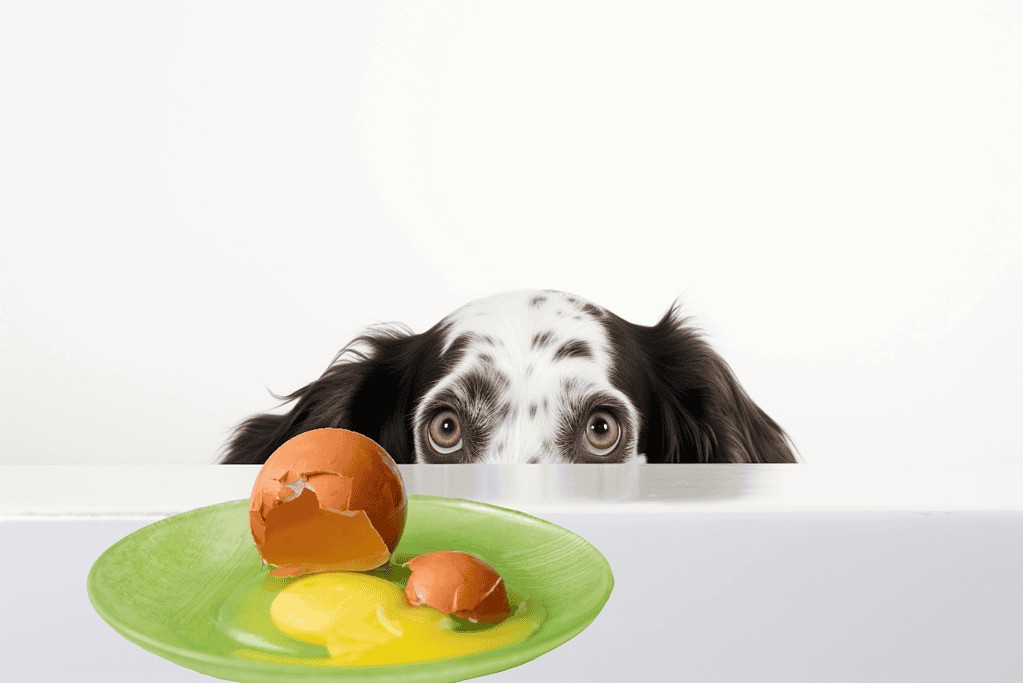
On the other hand, some believe dogs are pretty hardcore when it comes to handling raw eggs. After all, their wild ancestors have been gulping them down for ages without landing on dangerous ground.
But before you join the “raw egg for dogs” fan club, or swear off it for good, it’s important to crack the shell on this debate. Getting the scoop on the potential benefits and risks is crucial.
Nutritional Composition of Eggs

Let’s unwrap the nutritional bundle that these shells pack inside them. We already know they’re pretty awesome for humans, but did you know they’re equally terrific for our fur pals too?
Protein and Essential Amino Acids
Firstly, let’s talk protein.
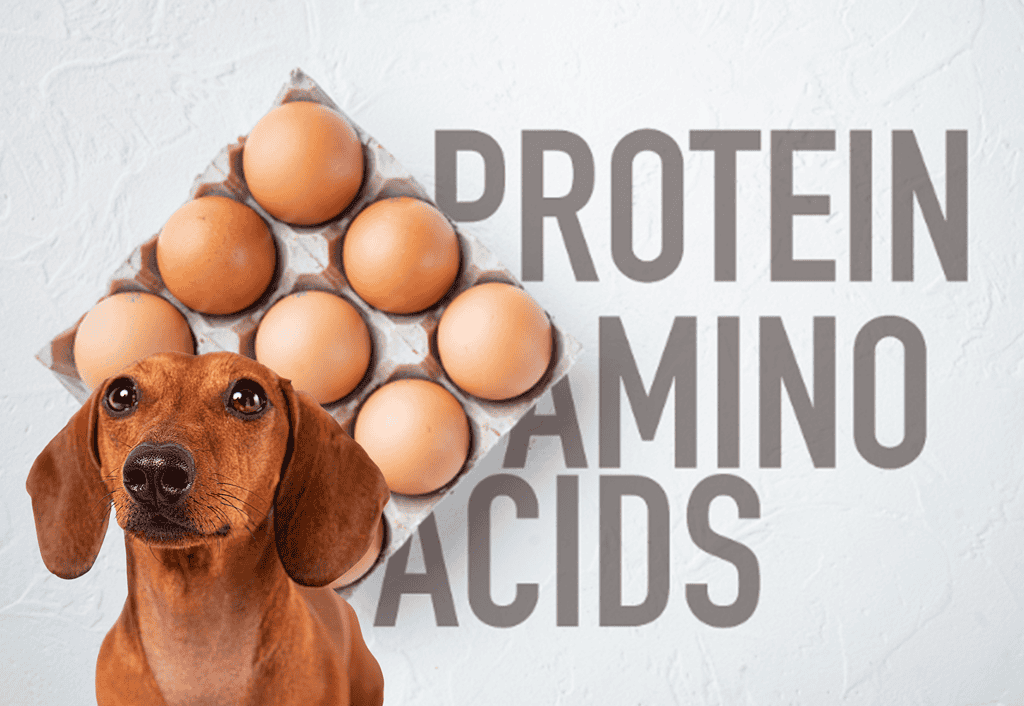
It has to be said eggs are total champs at this. They’ve got all the necessary amino acids your dog needs.
These amino acids are super easy on your pooch’s tummy. Not only do they help in promoting muscle growth, they also assist in the repair of tissues. One egg has about 6 grams of protein, which is perfect for your pup.
Vitamins and Minerals
Eggs are a nutritional powerhouse for dogs, packed with a variety of vitamins and minerals that boost their overall health. Notably, they contain Vitamin A, which is good for the immune system, skin, coat, and eyes.
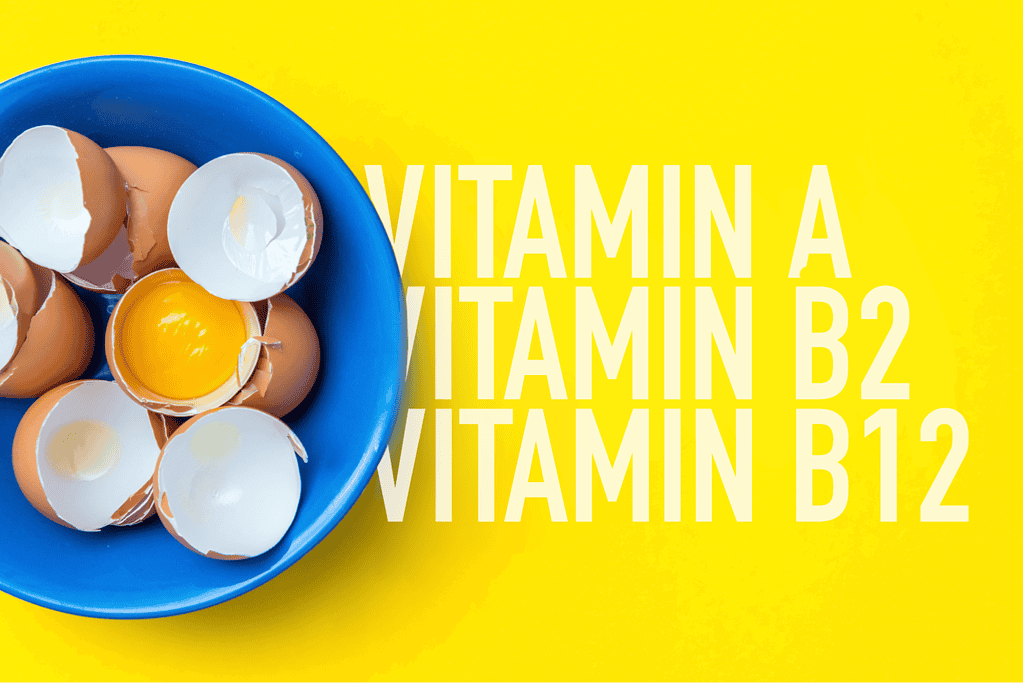
Riboflavin or Vitamin B2 is another key nutrient in eggs. It’s essential for cellular functions, ensuring a good metabolism, and turning food into energy.
Plus, eggs have Vitamin B12, which is super important for nerve function, making red blood cells, and even for creating DNA.
And that’s not all—eggs also have some must-have minerals. Above all, there’s lots of iron, which helps carry oxygen in the blood, giving your dog energy and keeping their immune system strong.

Then there’s selenium, a boss-level antioxidant that keeps your dog’s cells from getting damaged. It’s also good for thyroid health and gives an extra boost to the immune system.
Fatty Acids

Did you think we’d forgotten about fatty acids? No way, we’re just saving the best for last. Eggs are also a great source of essential fatty acids that work wonders for maintaining shiny coats, skin health, and overall cell function.
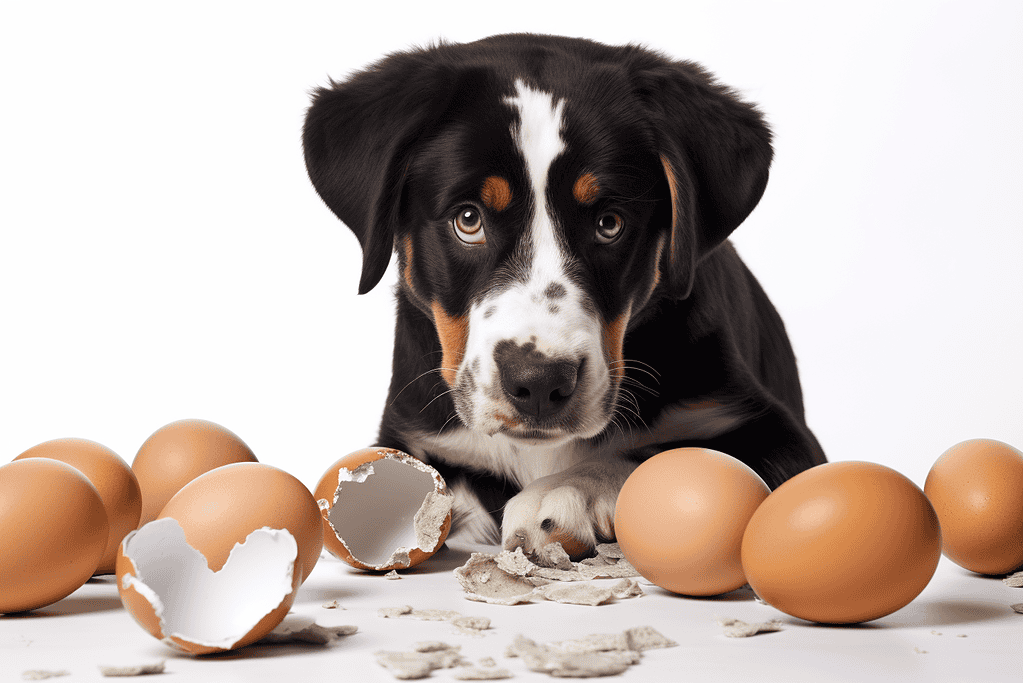
So, to sum it up, eggs are pretty much a superfood for your fur buddy. As long as you serve ’em up cooked – and in moderation – they’re the perfect addition to your dog’s diet, giving them everything they need.
So next time you cook an egg for yourself, maybe crack one open for your pup, too – just hold back on the rawness and the risk, please!
Potential Benefits of Eggs to Dogs
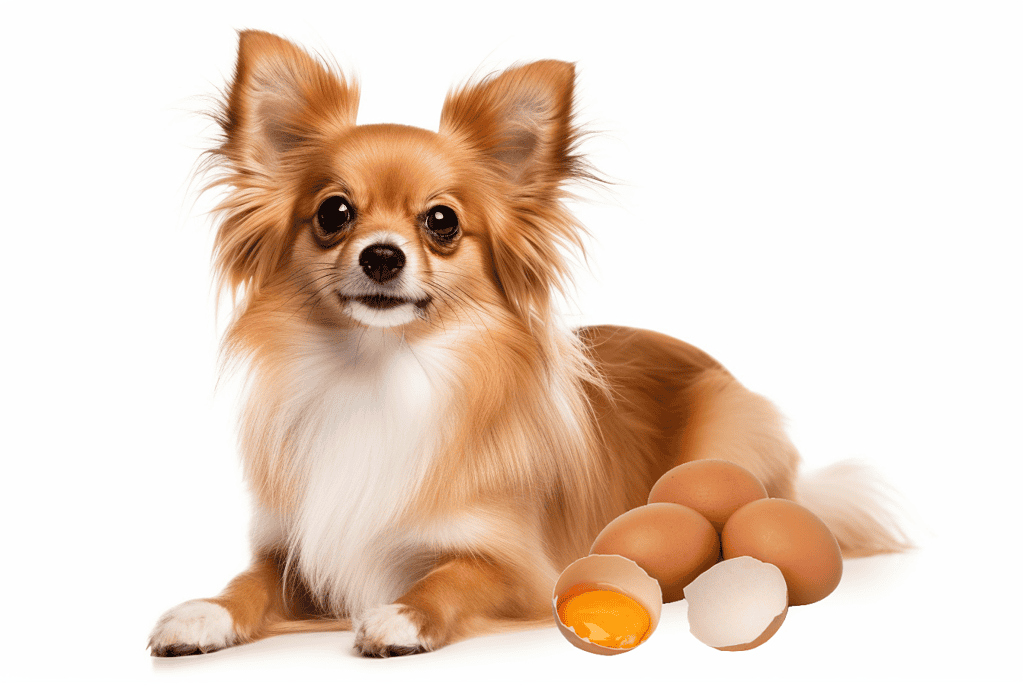
Heads up, fur parent! We’re about to dive into some of the killer perks your pooch can reap from the mighty egg.
Promotes Healthy Coat and Skin
Eggs are an excellent source of nutrients and vitamins for dogs, offering various benefits to their health.
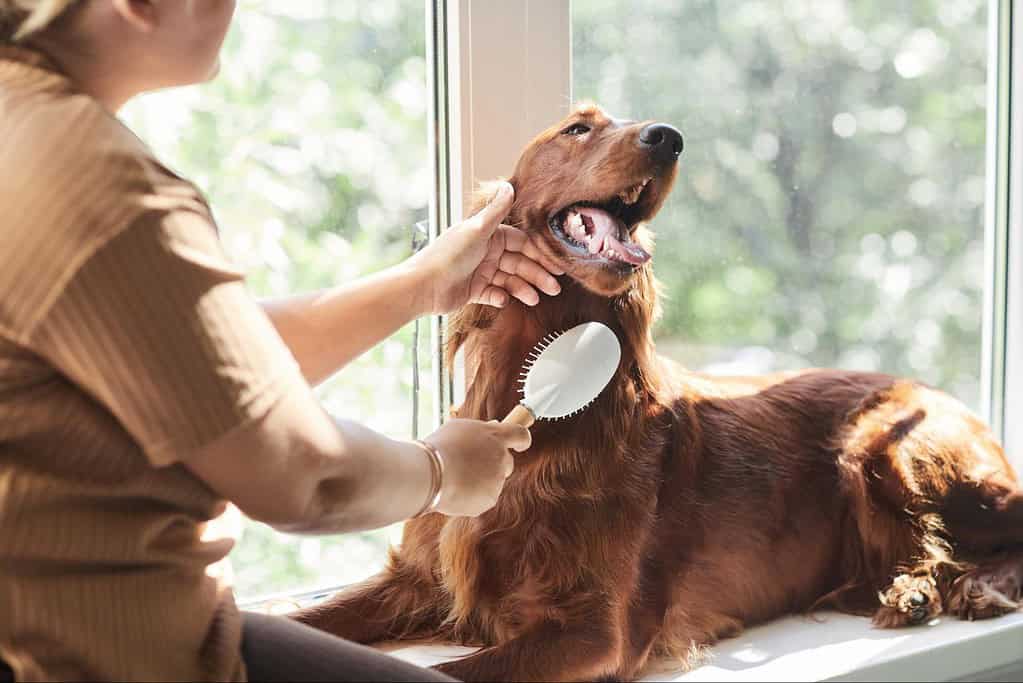
The presence of fatty acids and vitamins, specifically vitamin A and vitamin B12, contribute to the maintenance and support of a dog’s skin and coat. A healthy and shiny coat is often a clear sign of good overall health in an animal, and dogs are no exception.
Supports Dog’s Metabolism
Eggs aren’t just about looking good, they’re about feeling good too!

They come bundled with key nutrients like iron, selenium, and those famed fatty acids that keep your dog’s metabolism in check. This means your fur buddy can enjoy balanced energy levels and a defense system that’s ready for action.
Contribution to a Balanced Diet
Including eggs in a dog’s diet can provide them with a balance of essential nutrients. Eggs are a first rate source of protein, which dogs need for growth and muscle development.

The amino acids and fatty acids found in eggs contribute to a well-rounded, balanced diet that supports a dog’s overall health and well-being.

While eggs can work some small miracles for your fur pal, remember you’ve got to cook them right. Raw isn’t always better. Plus, raw egg whites have this pesky protein called avidin that might stop your pup from absorbing other vital nutrients.
So play it safe and cook up those eggs before offering them to your pooch. This way, you’ll be sure your dog is getting the best out of these tasty little nutrient powerhouses.
Enjoying this read?
We publish this content for free to generate interest in our Premium members' area. By subscribing, you can ask the writer any questions related to pet care and this article, get access to 100+ Premium Pet Care Guides and go Ad-Free with DogFix Premium for $2.99.
Risks Associated With Feeding Dogs Raw Eggs
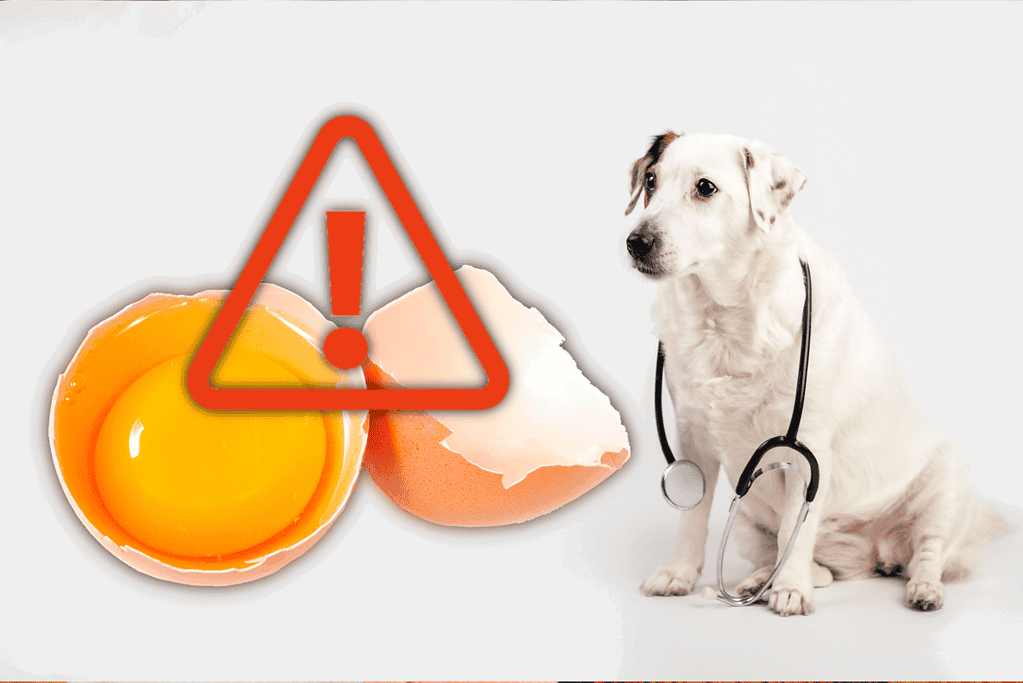
Remember that popular phrase “You can’t make an omelet without breaking a few eggs”? Well, what if we told you that breaking those eggs could lead to a few complications for your fur buddy?
It’s not quite as simple as just cracking open the shells.
Salmonella and Bacteria Infection
So, you’re thinking about raw eggs for your pooch? Well, here’s the deal: Salmonella and E. Coli are not just nightmares for us humans, they’re also bad news for dogs.
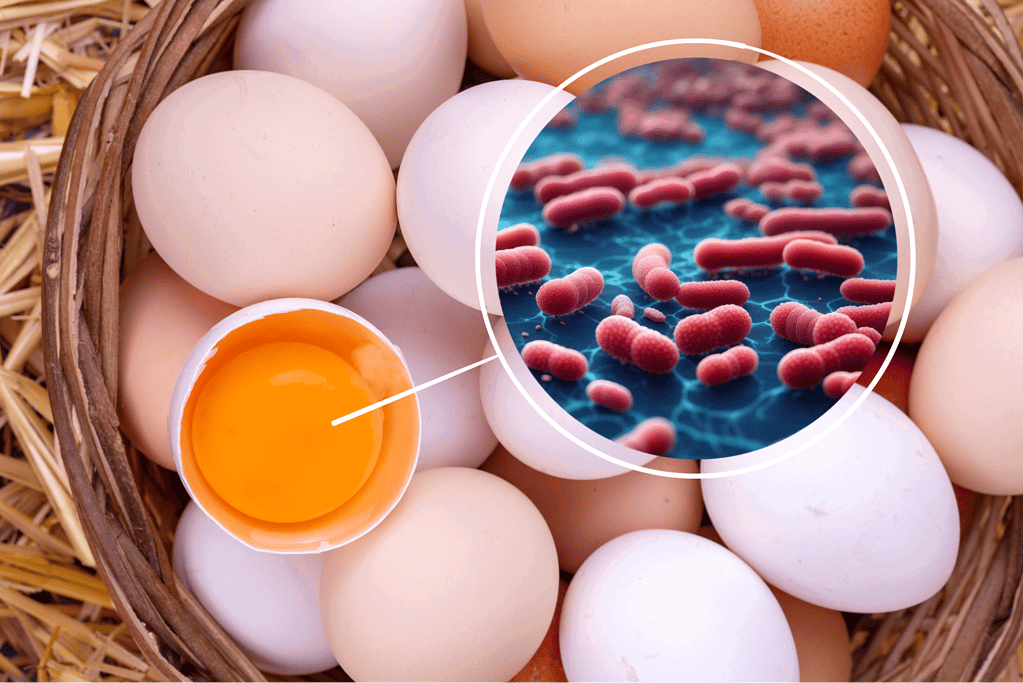
Although dogs may not be as susceptible to these infections as humans, they still face a risk. It’s essential to consider the source of the eggs and ensure that they are obtained from a trusted, preferably organic, supplier to minimize this risk.
Another bacteria-related concern is that raw egg consumption may cause vomiting and diarrhea, both of which are common symptoms of Salmonella infection in dogs.

Infection with this bacteria can be harmful to your pet’s health and could even be life-threatening in severe cases.
Risk of Biotin Deficiency
In the world of eggs, there’s more drama. On the one hand, they’re great at giving your pooch a health boost, thanks to biotin, which is awesome for digestion, skin, coat, and nerve function.
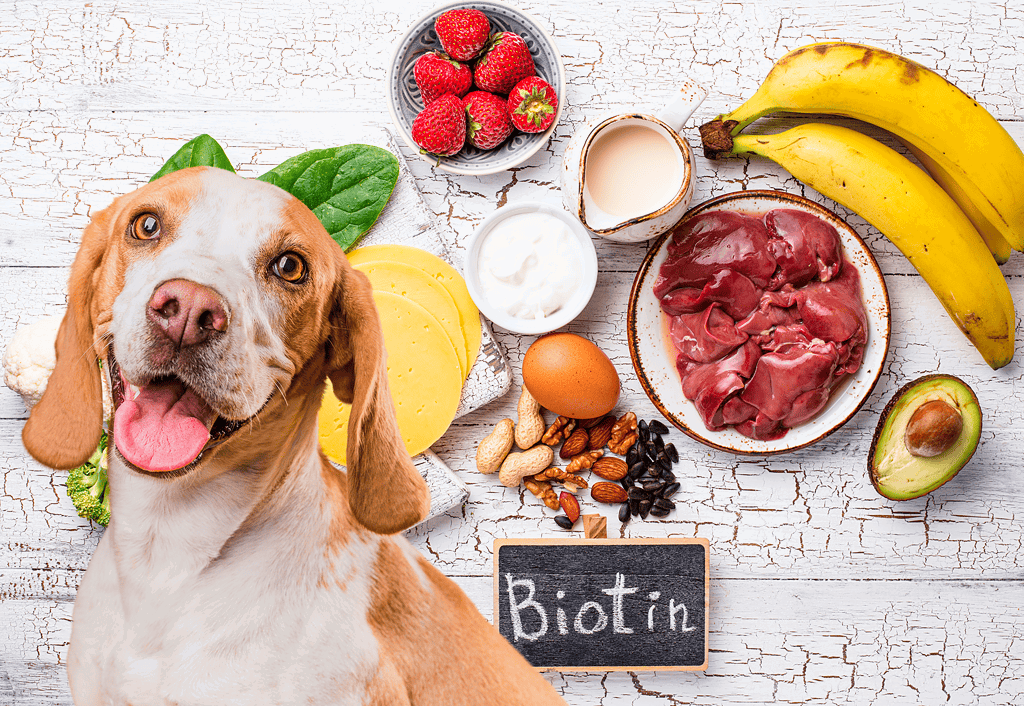
On the other hand, raw egg whites contain a protein called avidin which is a notorious biotin-blocking agent. Although biotin deficiency is quite rare, feeding your dog excessive amounts of raw eggs over a prolonged period could cause complications.

So, what’s the golden rule here? Flip those eggs into a pan. Cooked eggs still pack all that star nutrient power without the side order of risk. Safe, delicious, and nutritious, they’re an all-around win for your pooch’s health!
Signs of Adverse Reactions
Tummy Trouble

The yucky stuff – vomiting and diarrhea – might be the first clues of an allergic reaction. This can be directly tied to the dog’s allergy to eggs or indirectly due to gastrointestinal problems
Allergies
Then there’s the itch game. If you catch your fur pal scratching around their ears and paws or generally looking irritated, it could be a sign that something else is up.

Those proteins in eggs can sometimes stir up a storm and cause reactions after your pup gulps down the food.
Lethargy

Got a sluggish dog post-egg munching? Unusual tiredness and a sudden dip in energy might come down to the raw egg you dropped into the feeding bowl.
Fever
And last but not least, if a dog’s body temperature rises after consuming raw eggs, it could indicate serious health concerns.
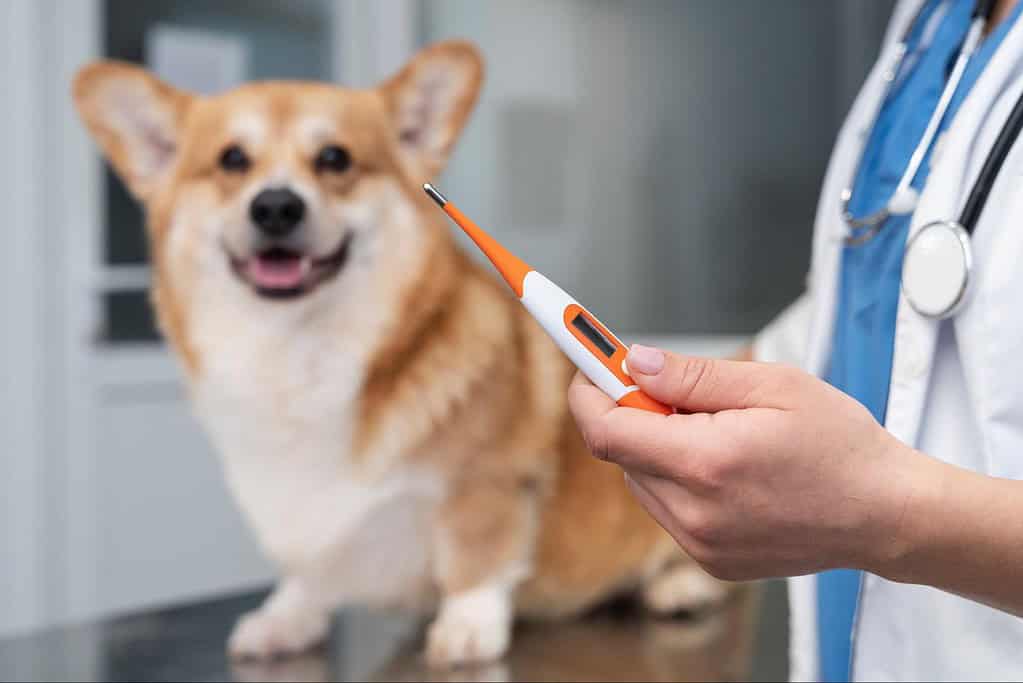
An elevated body temperature suggests your fur friend might be grappling with something serious, like salmonella infection.
Alternative Ways to Feed Eggs to Dogs

Let’s talk eggs again! But this time, we’re going beyond sunny-side up. So put on your chef’s hat, and let’s explore dog-friendly ways to serve our pooches this protein-packed superstar.
Cooked Eggs
First, we’ve got cooked eggs, plain and simple. Whip these babies up without any added fats like oil or butter, or any seasonings.
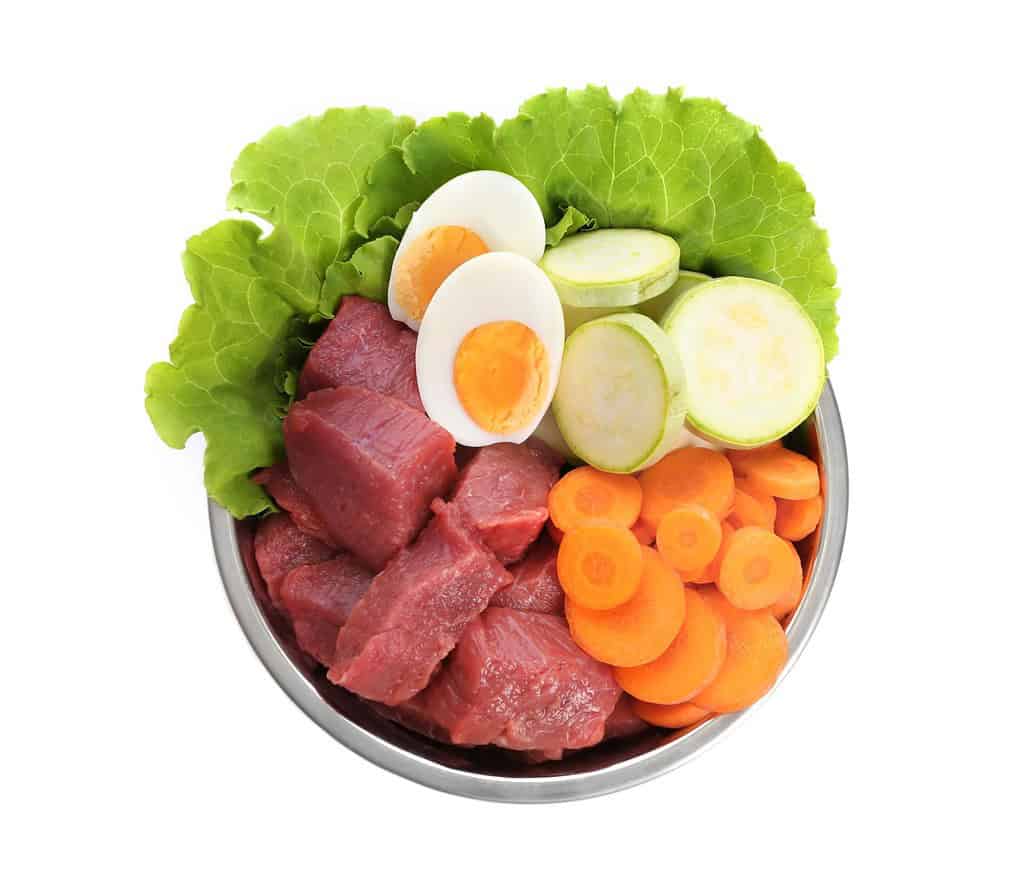
Who needs extra sodium or spices when you’re a dog, right? Either served on their own or mixed into your dog’s regular chow, these cooked delights are like protein power-ups for your fur pal.
Scrambled Eggs
For a fun twist, try some scrambled eggs. Just scrape that butter or oil off your shopping list and stick to a good non-stick pan. Remember to skip the salt and pepper – it’s a dog’s meal we’re talking about!

Make sure those eggs are fully cooked, allow them to cool, and serve them up for a delighted doggy. Wondering about portion size? Balance is key!
Scrambled eggs can be the occasional surprise your pooch looks forward to, or a supplement to their diet.
Hard-Boiled Eggs
Hard-boiled eggs are another excellent alternative for feeding eggs to dogs. Boiling eggs is as easy as one-two-three, and you don’t need any extra ingredients.

Place the eggs in a pot full of water, put it on the stove until it boils, and voila! Give it about 10 to 12 minutes of cooking, then pull them out to cool. Once they’re chill, peel off those shells and watch your pup gobble it down.

So, there you have it, a few ways to serve your fur buddy that delectable egg without pulling out the raw card.
Remember to match the servings to your pooch’s size and overall diet. And of course, if you’re ever uncertain, your vet’s the go-to person for all things edible for your fur friend.
Additional Considerations
Size and Weight of the Dog
Don’t let those begging eyes trick you, keep your dog’s size in mind. Smaller fur pals need a bit less grub than their bigger pals.
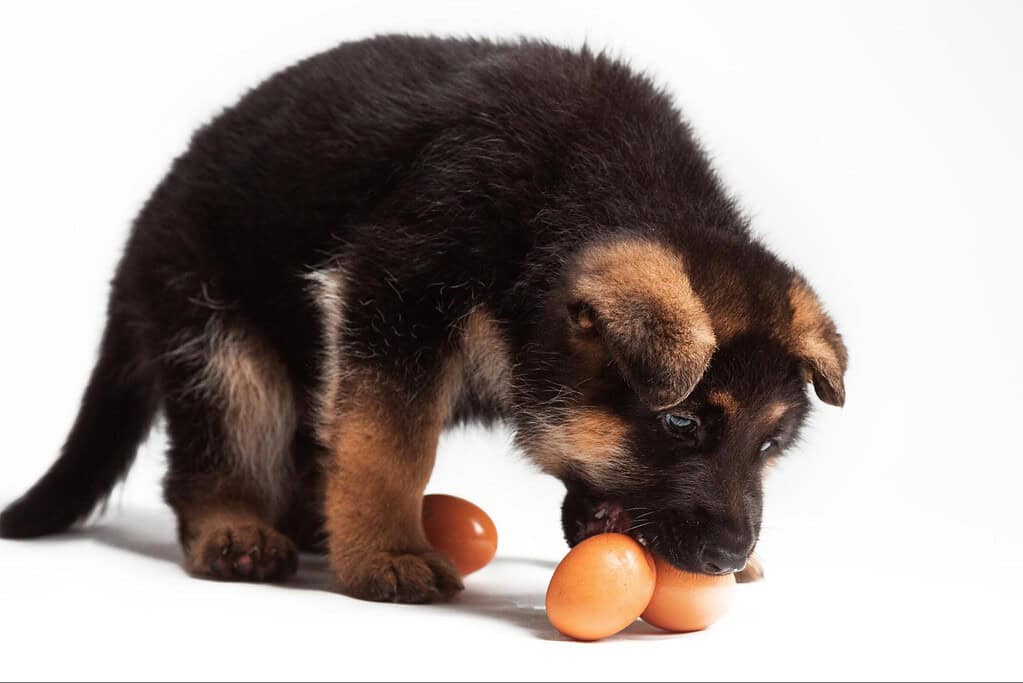
Also, remember, raw eggs carry a good number of calories, and we don’t want to tip the scales toward a tubby doggo. You need to make the egg servings not too large, not too small, but just right for your pooch.
Veterinary Consultation
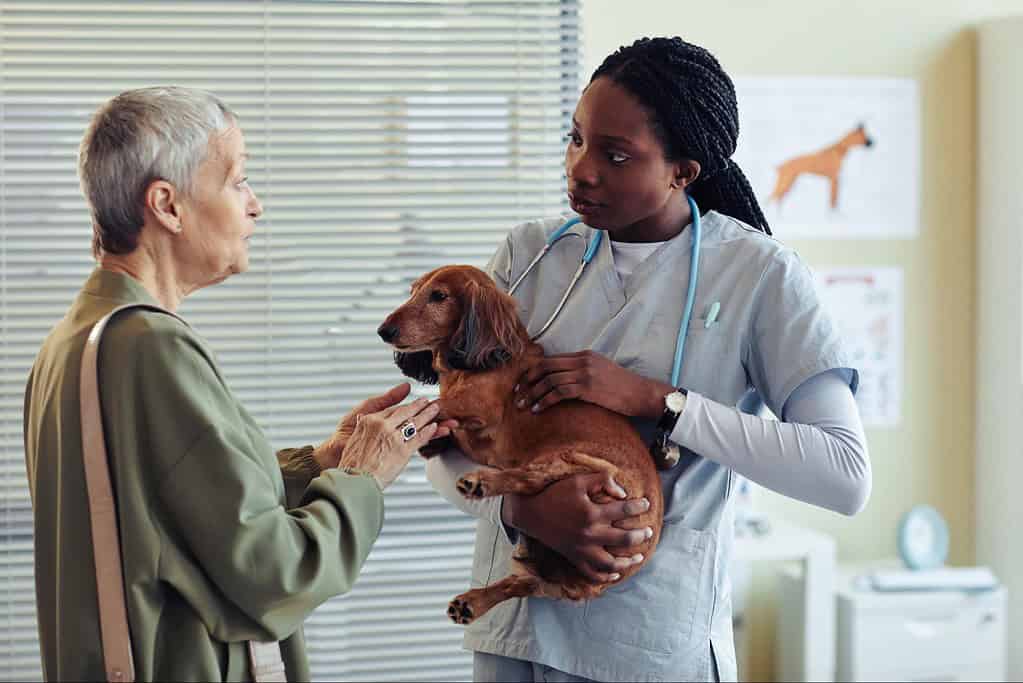
Thinking of shaking up your dog’s diet? A quick chat with your vet is a good place to start. They can guide you on the best way to introduce raw eggs or suggest alternatives if there are any health concerns.
Pre-Existing Medical Conditions
Different dogs, different health levels! If your fur friend has any pre-existing medical conditions like diabetes or digestive concerns, raw eggs might not be their best snack.
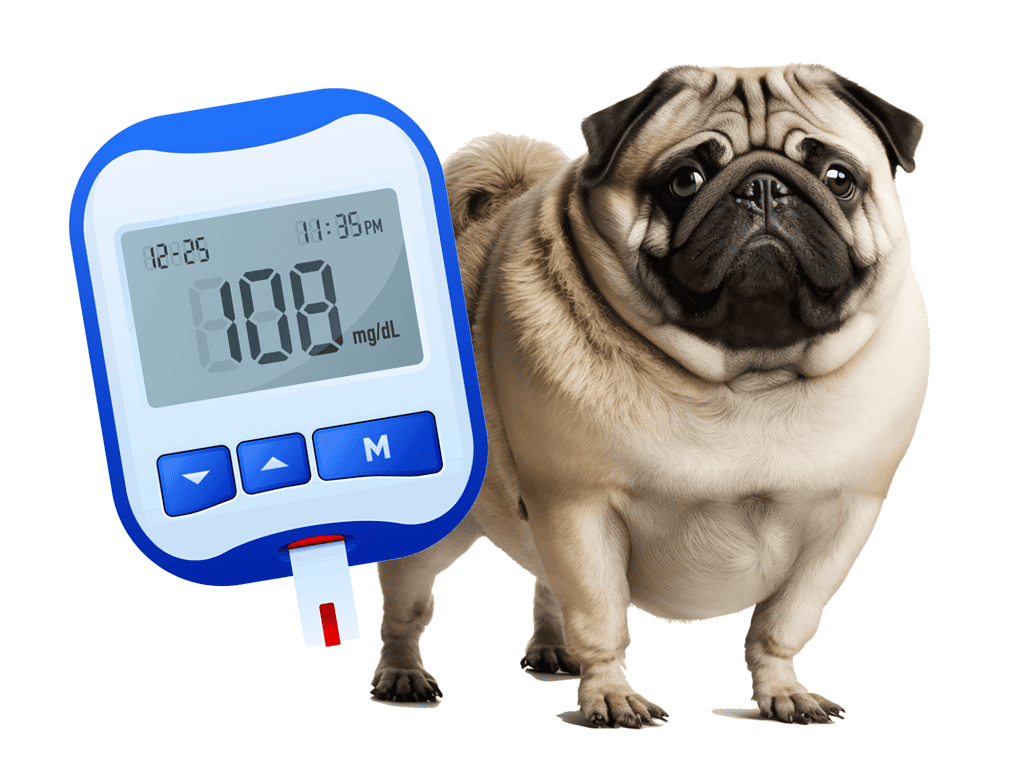
Always double-check with your vet before making eggs a regular on your dog’s feeding schedule.
Factor in Other Diets
Last but not least, remember to account for the calories and nutrients provided by their regular dog food.
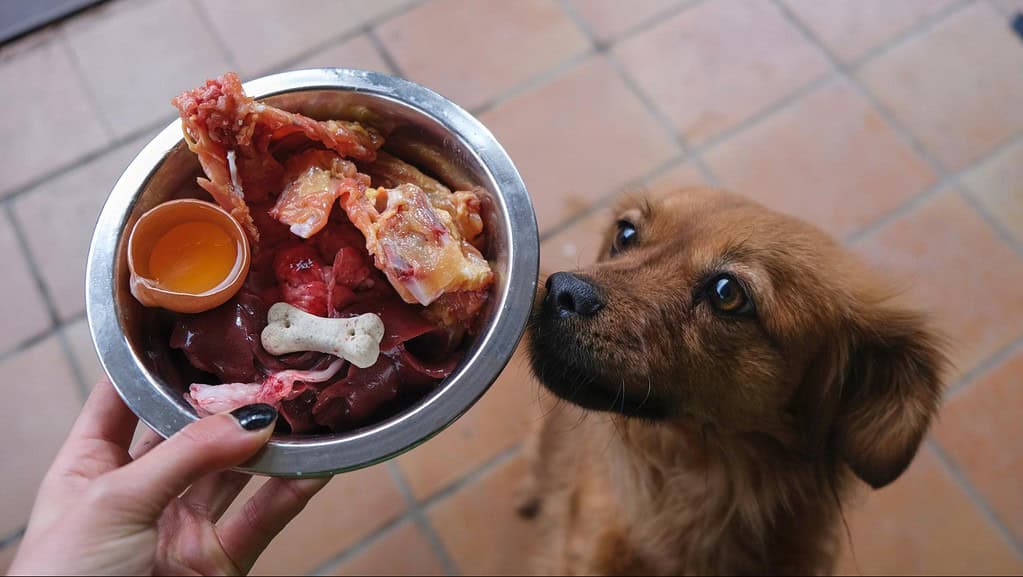
If your dog’s regular food already contains sufficient protein, vitamins, and minerals, adding raw eggs may lead to an excessive intake of certain nutrients.
Always aim for balance when it comes to your pup’s meals because too much of anything can tip the scale toward an unhealthy canine.
Frequently Asked Questions About Dogs and Eggs
Raw Eggs: Yay or Nay for Dogs?
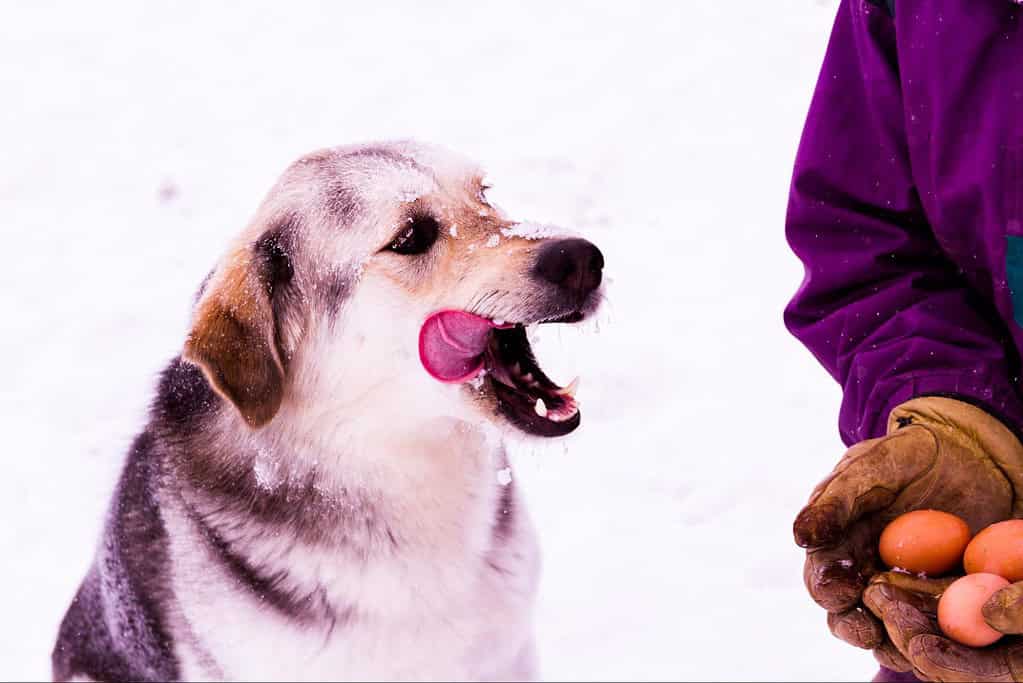
Hold your egg-citement! It’s best to scramble plans for raw eggs with dogs. They come with a side of risky business—salmonella and food poisoning.
Egg Frequency: What’s the Deal?

Let’s play it safe, folks! Raw eggs, not so much. But cooked eggs, like the hard-boiled champs or the scrambled superheroes, are a good call. Just get the vet’s two cents on how often and how much.
Health Hype: Are Raw Eggs the Superfood?

Not so fast! While raw eggs might seem like the superhero of the doggie diet, the dark side (salmonella) is strong. Cooked eggs are the way to go, packed with protein, vitamins, and all the good stuff minus the risk.
Puppy Egg Party: Safe for the Little Ones?

Absolutely! Puppies can join the egg party, but stick to the cooked ones. They’re packed with growing-up goodness. Just give your vet a shout to make sure the portions match those puppy paws.
Eggshells for Dogs: Yay or Nay?

Eggshells have a secret—calcium magic! Ground to powder and sprinkled in food, they’re like doggie tooth fairy helpers, supporting strong bones and teeth. Just ensure they’re clean and prepared, like a doggie chef’s secret ingredient. ????
What You Need To Remember
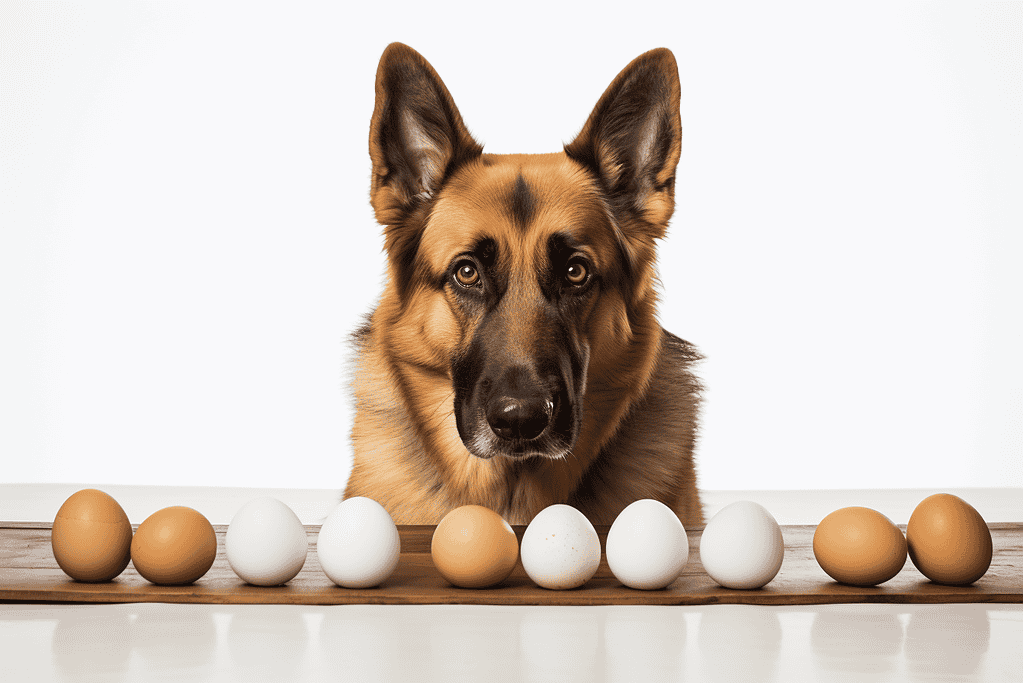
- Dogs can consume raw eggs, but there are potential risks involved, such as bacterial infections.
- Eggs aren’t just for humans! They’re packed with good stuff—fatty acids, vitamins, and those shiny minerals that make your pup’s coat healthy.
- Hard-boiled or scrambled, that’s the way to go for doggy delight. It’s like having the egg without the risk. Your pup’s tummy will thank you for the safer choice.
